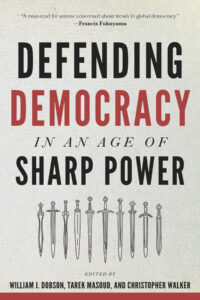
Defending Democracy in an Age of Sharp Power
Explores how authoritarian regimes are deploying “sharp power” to undermine democracies from within by weaponizing universities, institutions, media, technology, and entertainment industries.

Explores how authoritarian regimes are deploying “sharp power” to undermine democracies from within by weaponizing universities, institutions, media, technology, and entertainment industries.
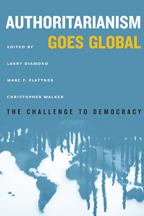
In recent years, as leading authoritarian countries such as China, Iran, Russia, Saudi Arabia, and Venezuela have become emboldened within the global arena, challenging the liberal international political order, the advanced democracies have retreated rather than responding to this threat.
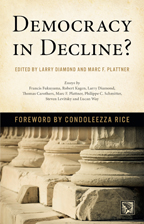
For almost a decade, Freedom House’s annual survey has highlighted a decline in democracy in most regions of the globe. Some analysts say this shows that the world has entered a "democratic recession." Others dispute that interpretation, emphasizing democracy’s success in maintaining the huge gains it made during the last quarter of the twentieth century.

The uprisings that swept the Arab world beginning in 2010 toppled four entrenched rulers and seemed to create a political opening in a region long impervious to democratization.
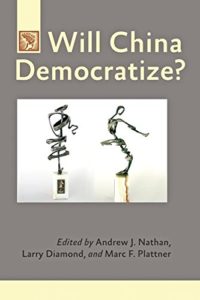
Although China has achieved extraordinary economic success without the CCP regime loosening its authoritarian grip, can the country continue its growth without political reform?

Democracy in East Asia offers a comprehensive treatment of the political landscape in both Northeast and Southeast Asia, including discussions of China, Japan, South Korea, Taiwan, Indonesia, the Philippines, Malaysia, Singapore, Thailand, Cambodia, Laos, Vietnam, and Burma (Myanmar).
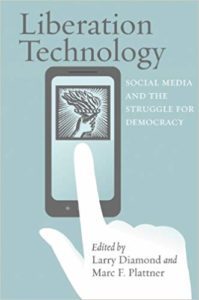
"Liberation technology" can help mobilize citizen protest and oust autocracies. Authoritarians can also use technology to stifle protest and target dissenters. Who will win the technological race between "netizens" demanding freedom and authoritarians determined to stay in power?
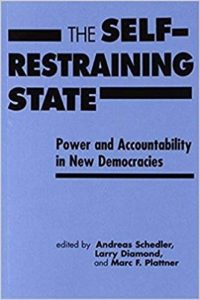
"[This] elegantly written and rigorously structured volume … constitutes an important landmark in the comparative study of democratization."—Carlos Santiso, Forum for Development Studies
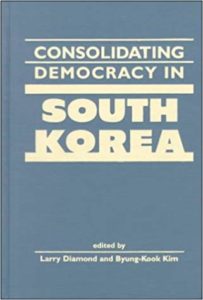
"Well worth reading…. A high-quality comparative political science analysis of democratic consolidation in South Korea."—Mette Skak, Political Studies

Drawn from outstanding articles published in the Journal of Democracy, The Global Divergence of Democracies follows the enthusiastically received earlier volume, The Global Resurgence of Democracy.

"Capitalism, Socialism, and Democracy Revisited is must reading for anyone who considers him- or herself a political economist, and it should also appeal to those probing the uncertainties of contemporary democratization."—Philippe C. Schmitter, Stanford University.

"Presents thought-provoking notions of the ways in which we view both nationalism and democracy and provides some valuable ideas for working toward a more stable world."—Journal of International Affairs
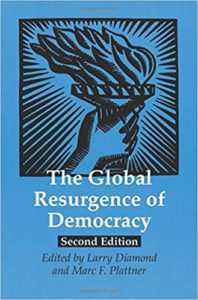
"A useful compilation popularizing the work of an influential journal… The Journal of Democracy is an effective tribune for mainstream U.S. thinking on these issues."—Political Studies

"Provides a wealth of information and some fresh thinking on the role of the military and civil-military relations in many parts of the world. The intellectual quality of most contributions is high and they are concise and well-written."—Dirk Berg-Schlosser, Commonwealth and Comparative Politics
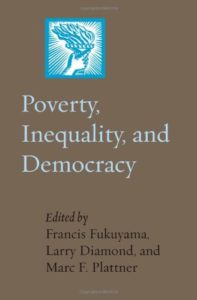
This book addresses such broad issues as whether democracy promotes inequality, the socioeconomic factors that drive democratic failure, and the basic choices that societies must make as they decide how to deal with inequality.

The global trend that Samuel P. Huntington has dubbed the "third wave" of democratization has seen more than 60 countries experience democratic transitions since 1974. While these countries have succeeded in bringing down authoritarian regimes and replacing them with freely elected governments, few of them can as yet be considered stable democracies.
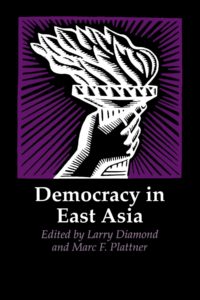
"Asian and non-Asian authors debate the desirability of democracy in East Asia… The two editors… do an excellent job introducing the issues, ideas, and approaches of the fifteen authors."—Foreign Affairs

Political parties are one of the core institutions of democracy. But in democracies around the world, there is growing evidence of low or declining public confidence in parties. But are they in decline, or are they simply changing their forms and functions?

Is the challenge of building and consolidating democracy under postcommunist conditions unique, or can one apply lessons learned from other new democracies? The essays collected in this volume explore these questions, while tracing how the countries of Eastern Europe and the former Soviet Union have fared in the decade following the fall of communism.
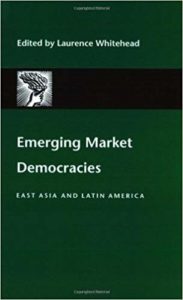
"Emerging Market Democracies provides useful insights into topics that connect market economies to various nations' politics, especially efforts at democratization, and compares and contrasts two important regions of the world in their quests for modernization."—John F. Copper, Asian Affairs